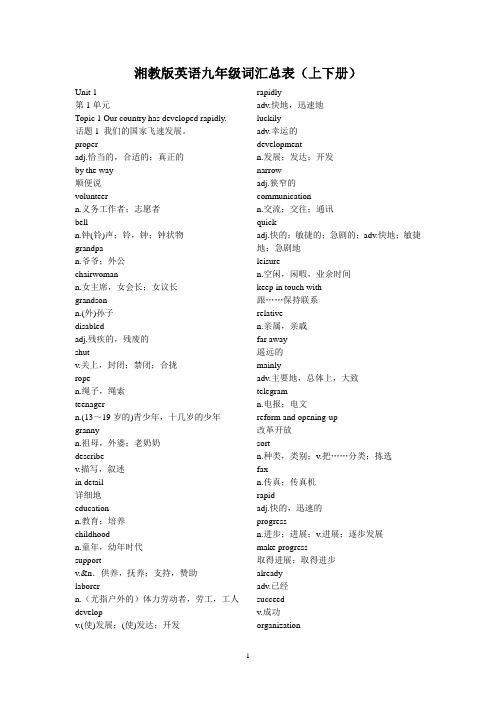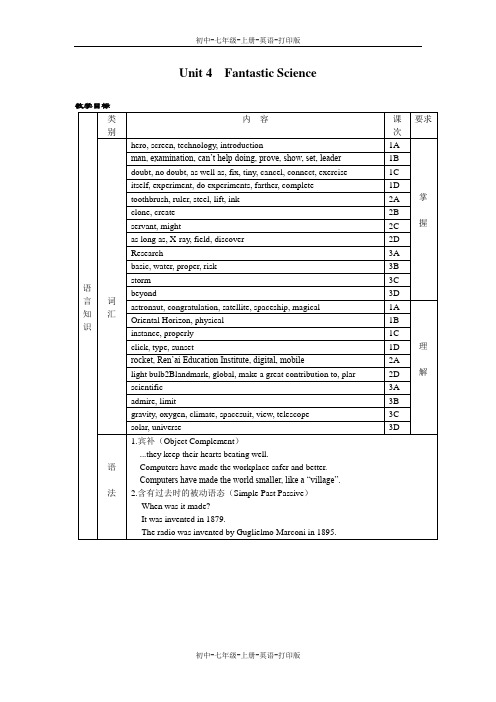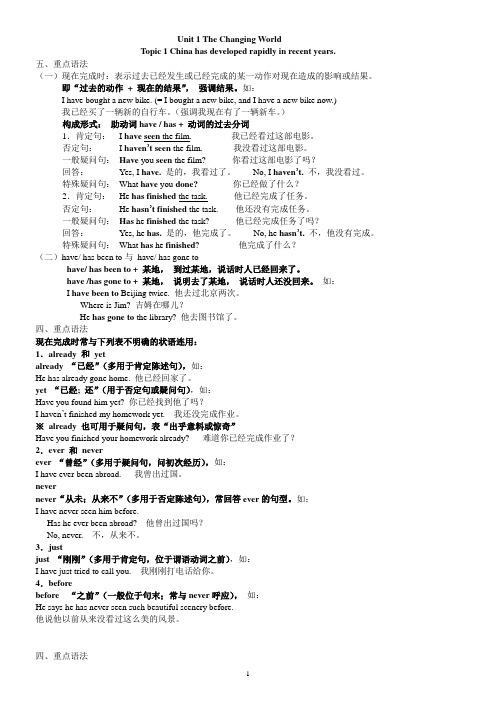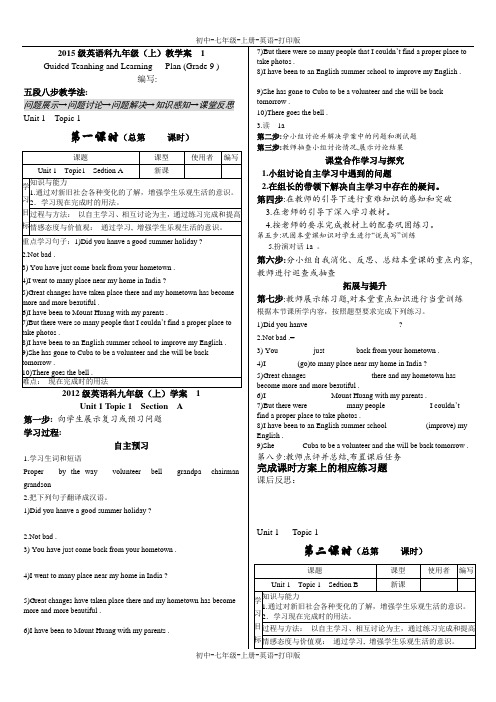湘教版-英语-九上-Topic 1 .(重点单词词组句子归纳)
- 格式:doc
- 大小:90.00 KB
- 文档页数:4

湘教版-英语-九上-Topic1.Unit 3 English Around the WorldTopic 1 English is widely used throughout the world.◆Topic: English is widely used throughout the world.◆Language Goals:1. Disneyland is enjoyed by millions of people from all over the world.2. English is widely used throughout the world.◆Teaching Aims and Demands1. Knowledge Objects :(1). Words and phrases: stick, be ready for, language, from now on, at last, bepleased with, on business, similar, be similar to, possible, conversation, translate, translate … into …, company, general, in general, besides, once in a while, whenever, tongue, mother tongue, state, speaker, communicate, conference, position, require, as well as, silence(2). Key sentences:1) I can’t wait to fly there!.2) Of all these languages, English is the most widely used.3) Two thirds of the world’s scientists read in English.2. Ability Objects: Learn how to get information by skimming.3. Moral Objects:Train the interest of students’ to learn English and communicatewith all the people in the world.◆Teaching Key Points: the present simple passive voice◆Teaching Difficult Points:the rules of changing the active voice into thepassive voice◆Functions:Talking about English around the world◆Teaching Methods:1. Individual, pair or group method to make every student take an active part in theactivities in class.2. Using discussion method to make every student to express himself in English.3. Skimming the text to get a general idea of the text.4. Scanning the text to get specific information◆Teaching Tools: computers, pictures, tape-recorder◆Teaching Design: 4-5 teaching periods◆Vocabulary:stick, language, similar, possible, conversation, translate,company, general, besides, whenever, tongue, state, speaker, communicate, conference, position, require, silence◆Teaching ProceduresSection AKey points:1. Learn the new words and phrases:stick, be ready for, language, from now on, at last, be pleased with2. Learn and master the simple present passive voice.Pre-task (Homework for preview):Get some information about Mickey Mouse, Donald Duck and Disneyland. Teaching Steps:StepⅠ Review1. Review countries, nations and languages.2. According to the table, introduce the new words and phrase: language, throughout, from now on.We speak Chinese.Chinese is spoken by us.Let students observe the difference of the two sentences and encourage them to talk about others in the form using the passive voice.4. Lead to the new lesson.StepⅡ Presentation5. Show pictures of Mickey Mouse and Donald Duck. Talk about them and lead to the new words and phrase: cartoon, character, stick, be ready for.6. Listen to the tape to do 2 and check the answers.7. Talk about Disneyland and lead to 1a.8. Listen to 1a and ask some questions about it.9. Read 1a carefully, then find out important and difficult points. Encourage students to solve problems by themselves, then give the additional explanation.Step Ⅲ Consolidation10. Work 1b alone and check the answers.11. Read 1a in groups and try to act it out in roles. Encourage the group which does well.Step Ⅳ Practice12. Practice the passive voice. Make sentences after the example in 3a.13. Discuss in groups to find out the rules of changing the active voice into the passive voice.14. Write down some sentences and ask students to change them into the passive voice.15. Encourage students to make sentences with the simple present passive voice. StepⅤ Project16. Work in groups. Show some verbs and ask students to review the past participleof the verbs. Then have a competition after a discussion. The group which makes17. Work in groups. Make sentences with the simple present passive voice to describetheir daily life. Then give a report to the class.Homework:1.We’ve learned so much about English spoken around the world. Is it necessary for us to have a good knowledge of English? Do you think English learning should be paid more attention to than Chinese learning? Please write a composition about it.2.Search for the information about the mother tongue in different countries. FindSection BKey points:1.Go on learning the use of the simple present passive voice.2.Learn knowledge about language and culture.Pre-task (Homework for preview):Search for the information about the national flag, the language, famous buildings of other countries ( at least 10 countries ).Teaching Steps:Step Ⅰ Review1.Ask some students to say some sentences in the simple present passive voice.Encourage them to make more examples.2.Show some sentences. Ask students to change thesentences into the simplepresent passive voice.3.Review the method of changing the active voice to the passive voice.4.Make sentences according to the information given in 3. Finish 3 and check theanswers.5.Lead to the new words and phrases.Step Ⅱ Presentation6.Play a game. The teacher gives the explanations while students say the new words.The student who answers first and correctly is the winner.7.Check answers, finish 1b.8.Show some questions about 1a. Listen to 1a and then answer the questions.9.Read 1a. Find out important and difficult points. Encourage students to solveproblems by themselves, then give the additional explanation.Step Ⅲ Consolidation10.Read 1a in pairs. Act it out in roles.11.Show some key words of 1a. Encourage students to try to retell 1a.Step Ⅳ Practice12.Read 2a quickly. Get the main information by skimming.13.Explain some new words and difficult points to help students understand 2a.Step Ⅴ Project14.Finish 2b. Circle the countries where English is spoken as the first language. Thenthe other countries should be written down, using the passive voice. Discuss the importance of English.15.Work in groups. Fill out the form. ( Draw pictures of the flags.) The group whichfinishes it best is the winner.Homework:1.How many languages are there in the world? Which language is the most widelyused? In how many countries do people speak English as the first language?Search for the information and write some sentences with the simple present passive voice.2.Find out on the Internet or from other resources the countries where English isspoken as the first language.Section CKey points:1.Go on learning the use of the simple present passive voice.2.Learn how to get information by skimming.3.Let students know the wide use of English in the world and encourage them tolearn English well.Pre-task (Homework for preview):Find out information about when and where people use English.Teaching Steps:Step Ⅰ Review1.Ask students to report their task last lesson: Find out how many countries in theworld where English is spoken as the first language.2.Sum up: About 70 countries use English as their first language. It’s lear n ed as thesecond language in over 100 countries.Step Ⅱ Presentation3.Talk about the importance of English. Let students know English is widely used inour daily life and encourage them to learn English harder.4.Learn and master the new words and phrases.5.Listen to 1a. Ask some questions about it.Step Ⅲ Consolidation6.Read 1a carefully, underline the topic sentences of each paragraph and then findsome examples in the passage to prove the topic sentence.7.Read 1a again and do 1b. Check the answers.S tep Ⅳ Practice8.Listen to 2 and finish it. Check the answers.Step Ⅴ Project9. Work in groups. Talk about the pictures in 3. Then discuss when and where10. Work in groups. Collect the English signs around us. Choose one of them to makea sign. Show the sign and explain it to the class. The group whose card is drawn bestis the winner.Homework:1.With the development of Great Britain and the U.S.A., English has become aninternational language. Read articles about the history ofGreat Britain and the U.S.A.2.Have you seen any English signs in the school? Make some English signs and putthem in the right places in the school.Section DKey points:1.Review and sum up the simple present passive voice.2.Get to know the history of English becoming the international language.Pre-task (Homework for preview):Find out how English has become the most popular language in the world. Teaching Steps:Step Ⅰ Review1.Review what we learned last lesson by asking and answering.2.Choose 1 or 2 students to retell 1a in Section C.3.Talk about the history of Great Britain and the U. S. A. Lead to the new section. Step Ⅱ Presentation4.Listen to 1a. Ask some questions about 1a.5.Read 1a carefully. Find out the new words and phrases. Try to understand them inthe passage.6.Give the additional explanation.Step Ⅲ Consolidation7.Read 1a again, find out the key sentences and learn about the history of English.8.Work in groups. Discuss how English has become the most popular language inthe world. Talk about the main stages in the development of English.9.Each group should give a report.10.Finish 1b, then check the answers.Step Ⅳ Practice11.Review the simple present passive voice. Read 2a.12.Read 2b together. Sum up more target expressions and sentences in the top ic. Step Ⅴ Project13.Which language will be most widely used in the future, Chinese or English? Why?English. Hold a debate competition.Homework:English is used all over the world. But do you think English is important in our daily life? As a student, is English useful to you? What do you learn English for? Write a short passage about the importance of English.教学反思:本话题的中心内容是谈论英语学习的重要性以及英语的广泛应用,以谈论迪斯尼乐园为切入点,进而过渡到英语语言的应用,围绕英语的应用展开话题。

九年级英语Unit 1 Topic 1 Our country has developed rapidly. 湘教版【本讲教育信息】一. 教学内容:Unit 1 The Developing World.Topic 1 Our country has developed rapidly.二. 重点、难点单词短语:feel sorry for the whole holiday learn… from …have a hard life in the past in detailgive support to…search…for…with the development ofkeep in touch with sorts of make progressdream about make preparations for slogan formascots for draw up thanks to句子讲解:Section A1. Rita, you have just come back from your hometown.丽塔,你刚刚从你的家乡返回。
此句为现在完成时态。
现在完成时由“助动词have/ has+ 动词的过去分词”构成,表示过去发生或已经完成的某一动作对现在造成的影响或结果,可与just,already,ever,never,yet等表示时间的副词连用。
如:She has just told me the news. 她刚刚告诉我那个消息。
I have already finished my homework. 我已经做完作业了。
Have you ever spoken to a foreigner? 你曾和外国人交谈过吗?My father hasn’t come back yet. 我爸爸还没有回来。
2. In one place I saw children working for a cruel boss. 在一个地方我看到孩子们正为一个残忍的老板干活。

初中-七年级-上册-英语-打印版新仁爱版九年级(上)Unit 1 重点词组、句型Topic 1take photos 照相so…that 如此……以致于have /has been to 到过an English training school 一所英语培训学校在地take part in 参加a disabled child 残疾儿童learn…from 从……学会around the world 全世界in the past 在过去in detail 详细地no chance 没机会make money 赚钱give support to 为某人提供帮助get a good education 得到好的教育have/has gone to 到过by the way 顺便问一下search the internet 上网used to be 去过曾经是with the development of China 随着中国的发展at sunrise 日出时grow cotton 种植棉花go hungry 变得很饿shout at 对……喊叫divide…into 把……分成send…to 把……送到……at that time 在那时feel satisfied with 对……满意be used to do sth. 被用来做……more than 超过during the vacation 在假期期间living condition 生活条件in recent years 在近几年make progress 取得进步live in present 立足现在dream about 展望未来happen to somebody/something ( 事情)发生在……身上,临到……头上happen to do something 碰巧thanks to 因为……,the capital of China中国首都host the 2008 Olympic Games 举办2008奥运会stand for 代表as well 也prepare for为……做准备taken place 发生with the help of 在……帮助下1.spend time (in) doing something 花费时间做某事2.see somebody doing something 看见某人做某事3.There goes the bell. 铃响了。

Unit 2 Saving the worldTopic 1 There are many kinds of pollution around us.教学引言本单元由老奶奶对环境的抱怨,引出关于环境污染的问题,并介绍不同种类的污染。
语法内容是继续学习现在完成时,为第二部分的展开提供了前提。
中考要求重难点词汇:produce, breathe, waste, cancer, influence, several, secretary, relation, fisherman, president, dead, disturb, downstairs, print, chemical factory, pour…..into, be harmful to.语法:现在完成时中延续性的动作或状态和由for, since引导的一段时间状语搭配使用。
日常交际用语:-How long have you been like this?-I have been like this since last month.It’s a beautiful place with flowers and grass.All the flowers, grass and fish have gone.It smells terrible.Look, there are several chemical factories pouring waste water into the river.It’s our duty to protect the environment.I have been at this school last year/ for one year.Noise is a kind of pollution and it’s harmful to our ears.要点聚焦----本单元重点扫描课堂小贴1: Oh boy, I can’t stand the environment here.哦孩子,我不能忍受这儿的环境。

Unit 1 Topic 1 Section C一、词汇短语1.tell a true story about oneself 讲关于—的一个真实的故事2.used to do sth . / was used to do sth.过去常常做某事/ 被用于做某事3.at sunrise日出4.divide my money into two parts.把我的钱分成两部分5.elder brother 哥哥6.be cruel for sb.对某人残忍7.at that time/on that day 在那时/在那天8.feel /be satisfied with对---感到满意9.---enough--- to do sth.足够---做某事11.My Report on Beijing 我关于北京的报告12. ring roads.环城路13. in recent years在近几年14. made such rapid progress.取得如此快的进步15.people’s living conditions –人们的生活水平二、重点句子1. I used to be a child laborer我过去是个童工2. Every morning, I got up at sunrise and went to the fields with the other children.每天早上,我日出时起床并和其他孩子去田野里劳动。
3. Our job was to grow cotton.我们的工作是种棉花。
5. One part was used to help support my family, the other, to help send my elder brother to school. 一部分被用于帮助支持家用,另一部分寄给哥哥在学校用。
6. Life was cruel for us at that time.那时生活对我们很残忍。

一、二、新湘九年级上册1Unit 1 The Developing World2Topic 1 Our country has developed rapidly.3cruel残忍的,残酷的,无情的adj.(形容词)cru.el.er 或cru.el.ler cru.el.est 或cru.el.lest Cruelhearted adj.狠心的, 铁石心肠的cruelly[♊❑☺☜●✋]adv. Cruelness n. cruelty [ ❑◆☜●♦✋]n.残酷, 冷酷, 刻毒[pl. ]残酷行为, 横蛮行为反义词:kind [kaind]n.种类, 性质adj.仁慈的, 和蔼的, 亲切的, 友爱的4proper[ ☐❑☐☜]恰当的,合适的;真正的a proper lady; a proper gentleman.一位有教养的淑女;一位有教养的绅士proper adj.适当的, 正确的, 固有的, 特有的, 有礼貌的, 正当的, 严格意义上的, 彻底的5by the way 顺便说6△volunteer 义务工作者;志愿者volunteer [ ●☜⏹♦✋☜☎❑✆]n.志愿者, 志愿兵adj.志愿的, 义务的, 无偿的v.自愿volume [ ●◆❍ ☎✍✆ ☜❍]n.卷, 册, 体积, 量, 大量, 音量7bell 铃;钟;钟(铃)声,钟形物白牛,牛铃铛8chairwoman女主席,女会长;女议长chairman[ ♦☞☪☜❍☜⏹]n.主席, 会长chairlady[♊♦☞♏☜●♏✋♎✋]n.(=chairwoman)女主席9yet尚,还,仍然yet [jet]adv.仍, 至今, 益发, 更conj.然而, 但是Much remains yet to be done.还有许多事情要做。
He has not yet heard the good news.他尚未听到过这个好消息。

湘教版英语九年级词汇总表(上下册)Unit 1第1单元Topic 1 Our country has developed rapidly.话题1 我们的国家飞速发展。
properadj.恰当的,合适的;真正的by the way顺便说volunteern.义务工作者;志愿者belln.钟(铃)声;铃,钟;钟状物grandpan.爷爷;外公chairwomann.女主席,女会长;女议长grandsonn.(外)孙子disabledadj.残疾的,残废的shutv.关上,封闭;禁闭;合拢ropen.绳子,绳索teenagern.(13~19岁的)青少年,十几岁的少年grannyn.祖母,外婆;老奶奶describev.描写,叙述in detail详细地educationn.教育;培养childhoodn.童年,幼年时代supportv.&n.供养,抚养;支持,赞助laborern.(尤指户外的)体力劳动者,劳工,工人developv.(使)发展;(使)发达;开发rapidlyadv.快地,迅速地luckilyadv.幸运的developmentn.发展;发达;开发narrowadj.狭窄的communicationn.交流;交往;通讯quickadj.快的;敏捷的;急剧的;adv.快地;敏捷地;急剧地leisuren.空闲,闲暇,业余时间keep in touch with跟……保持联系relativen.亲属,亲戚far away遥远的mainlyadv.主要地,总体上,大致telegramn.电报;电文reform and opening-up改革开放sortn.种类,类别;v.把……分类;拣选faxn.传真;传真机rapidadj.快的,迅速的progressn.进步;进展;v.进展;逐步发展make progress取得进展;取得进步alreadyadv.已经succeedv.成功organizationn.组织,机构warn.战争tug of warn.拔河noten.便条;笔记;注释;钞票,纸币;v.记下,记录;注意,留意compositionn.作文;作曲considerv.考虑draw up拟定,起草tooln.工具,器具thanks to幸亏,由于Unit 1第1单元Topic 2 China has the largest poipulation.话题2 中国拥有最庞大的人口。

Unit 1 Topic1.习惯用语:1.短语Take photos 照相Learn from 向学习In detail 详细地Give support to 为了search … for sth.搜索某地寻找某物See sth. oneself 亲眼所见某物Keep in touch with 与保持联系Sorts of 各种各样的Make progress 取得进步Make preparations for draw up thanks to2.重点句型I felt sorry for them.There goes the bell.Though I had no time to travel,……In one place I saw children working for a cruel boss.I felt sorry for them.Where have you been, Jane?There goes the bell.Did you spend the whole holiday working there?Though I had no time to travel, I still felt very happy.Now our country has developed rapidly.She has gone to library.3.语法精要—Where have you been?—I have been to Mount Huang with my parents.—Where has she/he been?—She/He has been to …—Have you ever cleaned a room?—Yes, I have. /No, I haven’t.—Has Ann ever …?—Yes, she has. /No, she hasn’t.---Where has your grandson gone?---He has gone abroad.—My granny has lived in Beijing for more than forty years.—Have you ever fed the disabled children? Yes, I have. /No, I haven’t.现在完成时:现在完成时用来表示之前已发生或完成的动作或状态,其结果的确和现在有联系。

Unit 4 Fantastic Science 教学目标Section AThe main activities are 1a and 2a. 本课重点活动是1a和2a。
Ⅰ. Teaching aims and demands 教学目标1. Master some new words:hero, screen, technology, introduction2. Help the students to learn the usage of object complement:We need to study harder to make computers serve our lives better.3. Learn something about ShenzhouⅤ and Ⅵ.Ⅱ. Teaching aids 教具杨利伟的照片/一些天体的图片/录音机/磁带/课件/幻灯片Ⅲ. Five-finger Teaching Plan 五指教学方案Step 1 Review 第一步复习(时间:13分钟)1.(师生互动。
以游戏的方式复习已学有关天体的词汇。
)T: Let’s have a competition to see which group can guess the right words. If someone gets the right word, I’ll give the group a flag. OK, Let’s see which group is the best.(以图画猜词的方式来导入新课,为的是活跃课堂气氛,引起学生兴趣,自然过渡到本课的中心词汇spaceship等。
图片内容:星星、月亮、太阳、天空、地球。
每张图片从部分到整体展示给学生,教师喊了“开始”口令之后,学生开始抢答。
教师可用自己擅长的方式处理图片。
可用电脑课件的特技、简笔画或现成的图片。
)T: Now let’s begin.What’s this? S1 , please.S1: Is it…?T: Sorry,it isn’t.S2, please.S2: Is it…?T: Yes, you are right. Great.(用同样的方法猜出全部图片,直到天空sky。

初中-七年级-上册-英语-打印版Unit 1 The Changing WorldTopic 1 Our country has developed rapidly.Section B★Support用法透视练学习★及物动词vt.1. 支撑,支托,扶持The old man entered the room supported by his grandson.老人由孙子扶着进了房间。
2. 支持,拥护,赞成;资助They supported the Democratic Party.他们支持民主党。
3. (常与can,cannot连用)忍受,忍耐4. 抚养,赡养He has a large family to support.他要抚养一大家人。
5. 为...提供证据,证实Can you give some examples to support your argument?你能举几个例子来证实你的论点吗?6. 激励,使有勇气(或信心)7. 保持;维持,使进行下去The desert climate supports little plant life.沙漠里的气候使绝大多数植物无法存活。
8. 【戏】替...当配角;演...的角色9. 【音】为...伴奏名词n.1. 支撑,支承2. 支撑物,支柱;支持者3. 维持生计,抚养;生活费Hunter is the chief support of the family.亨特是他一家的主要赡养者。
4. 抚养者,维持生计者5. 支持,拥护,赞成;鼓舞We need your support.我们需要你们的支持。
6. 【医】支持器,支托7. 【戏】配角8. 【音】伴奏supportWe strongly support the peace process. 此句中support用作及物动词,意为“支持”,这是support 的常用法。
support 还有其它用法。

Unit 1 Topic 1 Section A 辅导一、词汇短语1.after class下课后after school 放学后2.come back from从---回来3.feel sorry for sb.为---感到难过feel sorry to do sth.4. have been (to )+地点:(某人)去过某地,人已经回来。
5. have taken part in 参加have helped 帮助have spent 花费,度过have done 做have learnt 学6.in a disabled children’s home在一个残疾儿童之家7. learn sth. from sb.向某人学习某事Eg: We learn English from him every day .我们每天向他学习英语。
8. no time to do sth.没时间做某事9.work / clean -----for---为---工作/清洁10. the whole holiday整个下午=all the holiday二、重点句子1. Did you have a good summer holiday?你暑假过得愉快吗?2. How was your trip?你的旅行怎样?3. In one place I saw children working for a cruel boss.在一个地方,我看见孩子们在为一个残忍的老板工作。
4. I felt sorry for them.我为他们感到难过。
5. A: Where have you been, Jane?简,你去过哪儿?B: I have been to Mount Huang with my parents.我和我的父母去过黄山。
6.A: Where has he/she / kangkang been?他/她/康康去过哪儿?B: He has been to an English training school to improve his English.为了提高英语他去参加过一个英语培训学校的学习。

Unit 1 The Changing WorldTopic 1 China has developed rapidly in recent years.五、重点语法(一)现在完成时:表示过去已经发生或已经完成的某一动作对现在造成的影响或结果。
即“过去的动作+ 现在的结果”,强调结果。
如:I have bought a new bike. (= I bought a new bike, and I have a new bike now.)我已经买了一辆新的自行车。
(强调我现在有了一辆新车。
)构成形式:助动词have / has + 动词的过去分词1.肯定句:I have seen the film. 我已经看过这部电影。
否定句:I haven’t seen the film. 我没看过这部电影。
一般疑问句:Have you seen the film? 你看过这部电影了吗?回答:Yes, I have.是的,我看过了。
No, I haven’t.不,我没看过。
特殊疑问句:What have you done?你已经做了什么?2.肯定句:He has finished the task. 他已经完成了任务。
否定句:He hasn’t finished the task. 他还没有完成任务。
一般疑问句:Has he finished the task? 他已经完成任务了吗?回答:Yes, he has.是的,他完成了。
No, he hasn’t.不,他没有完成。
特殊疑问句:What has he finished? 他完成了什么?(二)have/ has been to与have/ has gone tohave/ has been to + 某地,到过某地,说话时人已经回来了。
have /has gone to + 某地,说明去了某地,说话时人还没回来。
如:I have been to Beijing twice. 他去过北京两次。

英语初三上仁爱湘教版unit1重点词组句子语音点Topic1SectionA一、词汇短语1.ebackfrom3.feelsorryforsb.4.havebeen〔to〕。
5.havetakenpartin/havehelped/havespent/havedone/havelearnt6.inadisabledchildren’shome7.learnsth.fromsb.Eg:WelearnEnglishfromhimeveryday.8.notimetodosth.9.work/clean-----for---10.thewholeholiday二、重点句子1.Didyouhaveagoodsummerholiday?2.Howwasyourtrip?3.InoneplaceI saw children working foracruelboss.4.I feltsorryfor them.5.A:Wherehaveyoubeen,Jane?B:I havebeento MountHuangwithmyparents.5.A:Wherehashe/she/kangkangbeen?B:HehasbeentoanEnglishtrainingschooltoimprovehisEnglish.7、Theregoesthebell。
=Thebellisringing.8.A:Haveyou spent thewholeholiday working there?B:Yes,Ihave./No,Ihaven’tspend---onsth./spend---(in)doingsth.9.A:Haveyouever takenpartin anyactivitiesduringthissummerholiday?B:Yes,Ihave. No,Ihaven’t.(否定回答)Unit1Topic1SectionB一、词汇短语1.writeanarticleabout2.haveahardlife3.Inthepast4.indetail5.afford6.nochancetodosth.7.What’smore8.helpsupporttheirfamilies9.theChineseteenagers’lives10.hasgone(to)+比较:havebeen〔to〕11.intheopenair12.loseacompetition二、重点句子1.Couldyouplease----?2.Parentscouldn’t afford education for theirchildren.3.Mostchildren hadnochanceto gotoschool.4.Ourcountryhasdeveloped rapidly.。

九上Unit 1 Topic 11.现在完成时I结构:主语+have/has + done(过去分词)否定句:在have/has后加not一般疑问句:把have/has提前already在否定句和疑问句中变为yet2.be happy to do sth. 高兴做某事e/be back from 回来,归来4.Great changes have taken places.发生巨变。
5.by the way 顺便说6.have/ has been to 曾经到过某地7.have/ has gone to 到……去了8.volunteer activities 志愿者活动9.have no time to do sth. 没有时间做某事10.in the past 在过去11.make friends 交朋友12.put on 上演,穿上13.the old/the homeless 老人/无家可归的人14.To help others makes us happy. 帮助别人使我们快乐。
15.There goes the bell. = That’s the bell. = The bellis ringing. 铃响了。
16.Long time no see. 好久不见。
17.It must be fun. 它一定很有趣。
18.have/ live a hard life 过着艰难的生活19.disabled children 残疾儿童20.learn…from ……从……学到learn a lot from…… 从……中学到很多21. a group of 一群22.have done something meaningful 做有意义的事情23.support family 养家糊口24.give support to sb. = give sb. support 为某人提供帮助25.in the 1960s 在20世纪二十年代26.get/ receive a good education 接受良好的教育27.with the development of… 随着……的发展28.living conditions 生活条件29.in the 1960s 在二十世纪六十年代30.have the chance to do sth. 有机会做某事31.have no chance to do sth 没有机会做某事32.keep in touch with 和……保持联系33.far away 遥远be far away from +地点离某地遥远34.reform and opening-up 改革开放35.what’s more 而且,甚至36.make progress 取得进步,取得进展37.succeed in doing sth = be successful in doing sth= do sth successfully成功地做某事38.sth happen to sb./sth. (某事)发生在(某人/某物)身上39.be popular with sb. 受某人的欢迎40.in the open air 在户外41.jump rope 跳绳42.with the help of = with one’s help 在……的帮助下43.satisfy people’s needs满足人们的需求44.not only…but also 不仅……而且……45.medical care 医疗保健46.remember the past 记住过去47.live in the present 活在当下48.dream about the future 展望未来49.leisure activities 业余活动50.play an important part in 发挥重要的作用51.play hide-and-seek 捉迷藏52.various kinds of 各种各样53.both… and… 和,两个都54.in one’s spare/free time 在某人空闲时间55.in recent years 近几年56.chat on the Internet网上聊天57.place of interest 名胜古迹58.make a tour abroad 出国旅游Unit 1 Topic 21.现在完成时II标志词:already, yet, ever, never, just, for, since,so far, in the past … yearsfor+ 时间段since+时间点since+时间段+agosince+从句用法:1 表示过去发生的事情对现在造成的影响或结果。


英语初三上仁爱湘教版全册词组Unit1Topic1seesb.doingsth.看见某人正在做某事be/feelsorryfor为…..感到难过have/hasbeento去过某地have/hasgoneto去某地了takephotos照相tellstories讲故事learn(sth.)fromsb.向某人学习have/liveahappy/hard/normallife过着幸福/艰难的/正常的生活indetail详细地havesthtodo有什么要做inordertodosth.为了做…helpsupportfamilies关心养家糊口givesupporttosb./givesb.Support为某人提供关心getagoodeducation受到良好的教育searchsw.forsb./sth..在某处搜查,查找search…forsth.…搜查,查找goabroad出国,athomeandabroad在国外withthedevelopmentof….随着……的进展haveabalanceddiet有均衡饮食what’smore.而且inthepast在过去atpresent现在seesth.oneself亲眼所见inthe1960s在二十世纪六十年代enjoyleisureactivities享受闲暇的活动keepintouchwith与..….保持联系since1978自从1978以来manysortsof=manykindsof许多种类的notonly…butalso…不但…../.而且makeprogress取得进步,取得进展happentosb./sth.发生在……身上makepreparationsfor为做预备drawup拟定,起草thanksto幸亏,由于Topic2getlost迷路,走失eachother互相atleast至少atthattime那时takeplace发生GreatchangeshavetakenplaceinChina.中国发生了巨大的变化. becauseof因为,由于one-childpolicy独生子女政策bestrictwithsb.对某人严格要求bestrictin/aboutsth.对某事严格要求anyother+单数名词increaseby+倍数或百分数“增加了……倍或百分之……”indevelopingcountries在进展中国家indevelopedcountries在发达国家Soitis.的确是,真的如此carryout实行,执行onefifth五分之一lesslivingspace较少的生活空间beshortof短缺sofar到目前为止takemeasurestodosth.采取措施做某事lessthan不到,少于acoupleof一些,几个befamousas…作为而出名workwellin(doing)sth.在某方面起作用25percentof百分之25的offersb.sth.提供某人某物keepupwith赶上,跟上Topic3thehomeless无家可归的人inneed在困难时,在贫困之中onceconj.一旦…就…,adv.一次,从前itis+adj.+forsbtodosth.对某人来说做…是decideon+n.\v-ing=decidetodosth决定要做某事providesb.withsth.=offersb.sth.提供给某人某物besucessfulindoingsth=succeedindoingsth成功完成某事feelgood感到愉快或有信心breakout爆发be/getusedto(doing)sth.适应(做)某事comeforavisit来参观rideaskateboard玩滑板gotoanamusementpark去游乐场seeafilmintheopenair看露天电影jumprope跳绳playtugofwar拔河playhide-and-seek捉谜藏returntoanormallife重新回到正常的生活obey/disobeytherules遵守\违反规那么takedrugs吸毒inthepast+时间在过去的……里inthepastsixteenyears在过去的16年里thepeopleathomeandabroad国内外的人们beusedforsth\doingsth被用来做某事Withthemoney用这些钱hearof听说hearfrom=receive/getaletterfrom收到来信仁爱九年级上册词组Unit2Unit2Topic1Therebe+sth./sb.+doingsth.有某人或某物正在做…since+点时间〔自从……以来〕,for+一段时间(长达…)pour…into…向…排放beharmfulto=doharmto对…有害produceterriblegas排放难闻的气体makesb.dosth.使某人做某事toomuchnoise太多噪音toomanyproblems太多问题managetodosth.设法做某事causehearingloss.=losehearing听力失聪,丧失听力thelookof………的外表notall…不是所有的都…becomedeaf变耳聋quiteafew/alot/bit许多,大量nobetterthan“同…〔几乎〕一样”,和…(几乎)一样坏duringtheclassroombreak在课间各种污染:air/water/soil/light/noise/litter/traffic/factory/plants/animalspollution produceranduserofcoal煤的生产者和消费者Topic2asaresult结果Thegovernmenthasdonesomethingusefultoprotecttheenvironment.政府差不多做了些有效的事去保护环境Noneofuslikespollution.我们中没人喜爱污染Whatshouldwedoasstudents?作为学生我们应该做什么leaverubbishhereandthere随处扔垃圾steponthegrass踩踏草坪spitinpublic在公共场所吐痰Nothingisdifficultifyousetyourmindtoit.世上无难事,只怕有心人payattentiontodoingsth注意做某事washaway冲走blowstrongly吹得猛烈dieout灭绝cutdown砍伐Alotofrichlandhaschangedintodesert,leavingonlysand.许多肥田变成沙漠,只剩下沙子stop/prevent/keepfromdoingsth阻止做runaway流走、跑走cutoffitswatersupply切断水供应Somethingswe’vedonearegood,whilesomearenotgoodfortheearth.我们所做的一些事对地球特别好,也有些不好beinbadhealth身体不好beindangerofdoingsth处于做某事的危险中plentyof许多cometorealize开始逐步认识BeachClean-upDay海滩清洁日either…or要么…要么Sincetherewillbealotofhardworktodotomorrow,makesureyougotobedearlytonight由于明天我们有许多事要做、确保你今晚早点睡觉makerules制定规那么keeptherules保持规那么follow/obeytherules遵守规那么daybyday日复一日Myfacehurt.=Thereissomethingwrongwithmyface.我的脸痛TheGreatGreenWall绿色长城toomanytrees太多树toomuchmoney太多钱atthesametime同时dealwith处理Topic3interviewsbaboutsth采访某人有关某事protecttheenvironment保护环境spreadthemessage宣传信息reducethewasteweproduce减少人为浪费usebothsidesofpaper使用纸的两面plasticbags塑料袋ratherthan而不notonly…butalso不但,而且throw…away扔掉collectwastepaperandsoftdrinkcans收集废纸和塑料瓶sothat以便It’skindofyoutodosth你做某事真是太好了should=oughtto=besupposedtodosth.应该agreenerperson一名绿色使者insteadof代替travelashortdistance短途旅行savemoneyandenergy省钱,省能量Easiersaidthandone.说比做容易Actionsspeaklouderthanwords.行大于言dealwith对付,处理nuclearenergy核能acidrain酸雨theMaglevTrain磁悬浮列车push…forward向前推MayIhaveyourattention,please?请〔大伙〕注意啦Ihavesth.importanttotellyou.我有重要的事要告诉大伙Pleasebeontime.请准时That’sall.我要说的就这些producepower/electricity发电It’sapitythat+句子遗憾的是beusedfordoingsth被用于做仁爱九年级上册Unit3Unit3Topic1米老鼠和唐老鸭的海报aposterofMickeyMouseandDonaldDuck 贴在墙上sticksthonthewall卡通人物cartooncharacters为……做预备bereadyforsth预备做某事bereadytodosth迫不及待做某事can’twaittodosth=can’thelpdoingsth. 有机会做某事haveachancetodosth练习做某事practicedoingsth能够做某事beabletodosth从现在起,开始fromnowon设法做某事tryone’sbesttodosth以后更加努力workmuchharderlateron和某人交流communicatewithsb和…相似besimilarto=bethesameas把…翻译成translate…into整理包packone’sbag出差onbusiness作为母语asmothertongue第二语言secondlanguage外语foreignlanguage官方语言theofficiallanguage(毫不)费力做某事have(no)trouble/difficulties(in)doingsth进行〔一次〕长谈havealongconversation,havelongconversations 与……相似bethesameas假如必要的话Ifnecessary向…求助ask…forhelp把翻译成translate…into…间或onceinawhile总的来说,通常ingeneral=usually随身带上某人/某物takesthwithsb.最新研究说明recentstudiesshow……的总数/数量thenumberof……许多anumberof被广泛使用bewidelyused参加一次国际性会议takepartinaninternationalconference上游泳课takeaswimmingcourse这是事实It’struethat+随着世界的进展withthedevelopmentoftheworld自从19世纪50年代以来sincethe1950s在二十世纪八十年代inthe1980s处于领先地位taketheleadingposition鼓舞某人做某事encouragesbtodosth在十九世纪inthenineteenthcentury号召callfor中国制造madeinChina把……看作,把…认为regard…as….也aswellasUnit3Topic2我听不懂你的话Ican’tfollowyou.请你说慢一点能够吗?Canyouspeakmoreslowly,please?澳式英语和英式英语一样吗? IsAustralianEnglishthesameasBritishEnglish?不确切,不完全Notexactly做得好Goodonya,mate=Welldone我明天要飞往迪斯尼乐园I’mflyingtoDisneylandtomorrow.祝你旅行愉快Haveagoodtrip!玩得快乐Enjoyyourself!一直,总是allthetime所以不Ofcoursenot取决于,视……而定,依靠dependon(doingsth)与…不同bedifferentfrom与…相同bethesameas……和……有不同差异havedifferencesbetween…and…成功做某事succeedindoingsth.使别人理解你makesb.understood(使动用法makesb.done)进行下一次的考试takethenextexam这单词的意思是什么?Whatdoesthiswordmean?=Whatdoyoumeanbythisword?=What’sthemeaningofthisword?去飞机场的路上onthewaytotheairport送别seesboff伸出putout如何了?What’sup?想搭车askforaride我要动身去……I’mleavingfor….我要走了I’mleaving打电话给某人callsb我叔叔明天会接见我们Myuncleismeetingustomorrow.你什么时候去迪斯尼乐园?WhenareyouleavingforDisneyland?我盼望可不能遇到什么困难IhopeIwon’thaveanydifficulty.不管何时你需要帮忙,发电子邮件或打电话给我Wheneveryouneedhelp,sendmeane-mailorcallme.我不明白I’mpuzzled.我只是开玩笑I’mjustkidding.至于某人/某物asforsb/sth一般来说,大体上generallyspeaking=ingeneral=generally起居室asittingroom=alivingroom填表格fillinaform=filloutaform乘地铁takethesubway=taketheunderground喜爱做某事enjoydoingsth.亲自做某事dosthinperson喜爱做某事befondofdoingsth.靠近beclosetosth=beneartosth众所周知asweknow发生comeabout〔强调缘故〕=happen〔强调偶然性〕被迫做某事beforcedtodosth在开始时inthebeginning慢慢地littlebylittle总之inaword你好吗?Howareyoudoing?写信给某人writetosb.写回信给某人writebacktosb.更糟糕的是evenworse向某人致以最美好的祝愿Bestwishestosb.Unit3Topic3使别人理解你makeyourselfunderstood陷入困境,特别尴尬getintotrouble和某人会谈haveconversationswithsb努力工作workhard在……努力,致力于workhardat….同意某人的看法agreewithsb.英语口语oral/spokenEnglish公开地,公然地,在公共场合inpublic犯困feelsleepy担心期末考beafraidofthefinaltest有时attimes=sometimes=onceinawhile向某人求助asksbforhelp=turntosbforhelp想要做某事feellikedoingsth=wanttodosth.=wouldliketodosth. 放弃giveup写日记keepadiary请再说一遍Ibegyourpardon.给某人一些关于…..建议givesbsomeadvice建议某人做某事advisesbtodosth在……方面特别差/弱beweakin不敢回答以下问题darenotanswerquestions担心做beafraidofdoingsth.担心犯错beafraidofmakingmistakes理解课文大意getthemainideaofthearticle深呼吸takeadeepbreath正确发音getthepronunciationright如何正确发音是我在学习英语方面的困难MydifficultyinlearningEnglishishowtogetthepronunciationright 做听力训练dosomelisteningpractice做……最正确时间thebesttimetodosth.开班会holdaclassmeeting和某人分享…sharesth.withsb.和你们分享我们小组的观点shareourgroup’sopinionswithyou回答replyto回答老师的问题replytotheteacher’squestions感谢你的倾听Thankyoufor〔your〕listening.做某事感到荣幸It’sanhonortodosth.尽可能经常asoftenaspossible就这些That’sall.记住去做某事remembertodosth.记住做过某事rememberdoingsth.坚持做某事insistondoingsth/keepondoingsth.起初atfirst笑某人laughatsb.造〔完整的〕句子make(complete)sentences为了做某事inordertodosth./inorderthat+句子写日记keepadiary最后,但同样重要的Lastbutnotleast仁爱九年级上册Unit4Unit4Topic1载人飞船amannedspaceship成功着陆landsuccessfully特别高心见到你Pleasedtomeetyou.做某事是我的荣幸It’sanhonortodosth.你现在感受怎么样?Howareyoufeelingnow?总得来说Ingeneral好好休息takegoodcareof在飞行期间duringtheflight做了体检havephysicalexaminations健康状况良好ingoodhealth制作录象makeavideo用录象机录下我们的活动经历makeavideoofourexperiences禁不住做某事can’thelpdoingsth反复地,再三地againandagain轮流做某事taketurnstodosth看到一个光明的以后seeabrightfuture在做某事方面取得进步makeprogressindoingsth.为感到自豪beproudof(doing)sth.=betheprideof(doing)sth. 为…感动bemovedby请你告诉我一些关于Couldyoutellmesomethingabout…..劝某人做某事advicesb.todosth.使〔叫〕某人做某事makesb.dosth.建议你更加努力学习使电脑更好的服务于我们的生活…adviceyoutostudyhardertomakecomputerserveourlivesbetter 期望某人做某事expectsb.todosth.计算机在工作和娱乐的许多方面差不多变得特别重要Computershavebecomeveryimportantinmanyareasofworkandplay. 毋庸质疑thereisnodoubtthat…在科技和商业领域intechnologyandbusiness在…的关心下withthehelpof…/withone’shelp使心脏正常跳keepheartsbeatingwell下定单或取消定单placeandcancelorders计算机使工作场所更安全,更好Computershavemadetheworkplacessaferandbetter.出现,产生comeintobeing多亏,由于Thanksto….做生意dobusiness玩游戏playgames看电影watchmovies购物doshopping在线聊天chatonline例如suchas/forexample/forinstance头痛getheadaches眼睛发炎getsoreeyes正确使用usesth.properly发送,接收邮件sendandreceiveanmail连接起来jointogether按照下面的指示做followthesedirections打开turnon把……和…..连接connet…to/with…连上英特网connecttotheInternet点击clickon输入typein在屏幕上onthescreen一组信息的目录alistofmessages做完某事finishdoingsth做实验doexperiments期待(做)某事lookforwardto(doing)sth日出日落thesunriseandsunset/Thesunrisesandsets.(句子)祝贺你congratulationstoyouUnit4Topic2Whenwasitdeveloped?被同意做某事beallowedtodosth对……有害bebadfor把……给某人看showsth.tosb.由……制成bemadeof/from/in用来发射卫星或宇宙飞船It’susedforlaunchingsatellitesorspaceships 被用来做…..beusedfordoingsth.它〔纸〕是用来写字的It’susedforwritingon.许多信息alotofinformation那个用英语如何说HowdoyousaythisinEnglish?=What’sthisinEnglish?由…开发/发明/研制bedevelopedby/beinventedby在日常生活里inone’sdailylife在某人一生期间duringone’slife据说/据报道It’ssaid/reportedthat+克隆羊theclonedsheep到目前为止,至今为止sofar如你所知asyouknow:人类humanbeings:生物livingthings:和…相似besimilarto和…一样thesameas:确切明白knowforcertain成为我们生活中的一部分bepartofourlives作为…而出名beknownas:对…感到惊异besurprisedatsth独立思考thinkforthemselves警告某人某事warnsbof/aboutsth警告某人不要做某事warnsbnottodo不再nolonger=not…anylonger把……看着/视为treast….as…为…做巨大贡献makeagreatcontributionto(doing)sth在医学领域inthemedicalfield对…有(不良)妨碍havesome(bad)effectson…发明findout对某人有用beusefultosb发挥特别好的作用workwellin只要aslongas实现cometrue大约5点钟around/aboutat5o’clock在我们的日常生活中inoureverydaylife一千多个发明morethanonethousandinventions在其余时间里duringtherestofthetime迷路lostone’sway=getlost=belost在森林中迷路lostone’swayinaforest被公认为一项伟大的发明beknownasagreatinvention总而言之inshort=inawordUnit4Topic3Wewillliveinspaceoneday.太好了/太令人兴奋Soundsgreat!/Thatsoundsexciting.乘宇宙飞船byspaceship有关太空生活aboutlifeinspace多么有味Whatfun!我可能不〔会〕。

Unit 1 Topic 1 Section B一、词汇短语1.write an article about---写关于---的文章2.have a hard life过艰苦的生活3.In the past 过去4.in detail详细5.afford ---for -----为---提供--6.no chance to do sth.没机会做某事7.What’s more 而且8.help support their families帮助支持家用9.the Chinese teenagers’ lives中国青少年的生活10.has gone (to)+ +地点:(某人)去某地,在路上或到达了某地,人还没有回来比较:have been (to )+地点:(某人)去过某地,人已经回来。
11.in the open air在户外12.lose a competition输了竞赛二、重点句子1.Could you please----?+动词原形2.Parents couldn’t afford education for their children.父母无法为他们的孩子提供教育。
3.Most children had no chance to go to school.大多数的孩子没有机会上学。
4.Our country has developed rapidly. 我们国家已快速发展。
5. A :By the way, where’s Jane?随便问一下,简在哪里?B: She has gone to the library.她去图书馆了。
(在路上或在图书馆,人没回来)6.A: Has he / she ever…? 他/她曾经做过某事吗?B: Yes, he/she has. / No, he/she has never done that.是的,他/她做过。
/不,他/她从来没做过。
7.A: When did he/she study abroad?他/她什么时候去过国外学习?B:He/She studied abroad a few years ago。
九年级上Unit 1 Topic 1一、词汇短语1.after class2.come back from3.feel sorry for sb.4.have been (to )。
5. have taken part in /have helped / have spent /have done /have learnt6. in a disabled children’s home7. learn sth. from sb.Eg: We learn English from him every day .8.have no time to do sth.9.work -----for---10. the whole holiday11.see sb doing/ do sth12.take photos/ pictures13. an English traning school14. in a disabled children’s home15.feed the disabled children16.spend17.tell stories to the kids18.learn a lot/ alittle19.have a hard/happy /normal life20.in the past21.in the past year22.in the past few years23. discribe it in detail24.afford sth for sb25 have no chance to do sth26 have some trouble/ difficulty (in) doing sth27.at ptesent/ nowadays28. help support their families29.get a good education30. What’s more.31.search …for…32.learn sth about…33.give support to…34.with the help of…35.keep/have a balanced diet36.go abroad37. study abroad38. in the open air39.enter a competition40 win/ lose a competition41.write a lettered to do sth43 get/be used to doing sth44. be used to do sth45.one…., the other…46. some……, others…47.on the other hand48 on the other side of..49. at sunrise50. fall ill51 send …to…52. elder brother53 .be cruel for sb54.at that time/ moment55. feel/ be satisfied with…56. happen/ take place57 What happened to sb?58.dream of/ about…59.in the future6.in recent years61. in the past62.ring roads63.living conditions64.thanks to..65 .stand for…66.prepare for/ get ready for..67. welcome to….68. consider doing sth69. manage to do sth.70.Is that so ?71. consider …as…72. plant crops73. draw up…74.have gone to75. have been to..76. have been in….(for…)1.One World, One Dream 2.Thanks to the government’s efforts 3.the capital of---4.. the rich culture of china5.as well6.with the help of =with one’s help.7.divide my money into two parts.8. at that time/on that day9. --enough--- to do sth.10.made such rapid progress11. write an article about12.the Chinese teenagers’ lives二、重点句子1.Did you have a good summer holiday?2.How was your trip?3.In one place I saw children working for a cruel boss.4.I felt sorry for them.5.A: Where have you been, Jane?B: I have been to Mount Huang with my parents.6.A: Where has he/she / kangkang been?B: He has been to an English training school to improve his English.7.There goes the bell。
=The bell is ringing.8. A: Have you spent the whole holiday working there?B: Yes, I have. / No,I haven’tspend---on sth./ spend---(in)doing sth.9. A: Have you ever taken part in any activities during this summer holiday?B: Yes, I have. No,I haven’t.(否定回答)1.Could you please----?2.Parents couldn’t afford education for their children.3.Most children had no chance to go to school.4.Our country has developed rapidly. 。
5. A :By the way, where’s Jane?B: She has gone to the library.6.A: Has he / she ever…?B: Yes, he/she has. / No, he/she has never done that.7.A: When did he/she study abroad?B:He/She studied abroad a few years ago。
I used to be a child laborer2. Every morning, I got up at sunrise and went to the fields with the other children.3. Our job was to grow cotton.5. One part was used to help support my family, the other, to help send my elder brother to school.6. Life was cruel for us at that time.7. You should feel satisfied with your life now.8. Now, children’s lives are much better than before.9. My uncle has worked in Beijing for more than twenty years.10.China has developed rapidly in recent years.11. More and more ring roads have appeared12.People’s living conditions have improved a lot.13. China has made such rapid progress14.It is important to remember the past, live in the present and dream about the future.1.expresses the wishes of 1.3 billion Chinese people for a better world tomorrow.2.They express the rich culture of china as well.Topic 1单词表1.培训 2. 钟3.残疾的 4 整个的5中学习 6 弄整洁7.文章8.祖母9.描写10细节11详细地12.提供13 教育14 v.&n.供养15童工16 adv.当今17.(使)发展18.快地19n.娱乐20n.发展21 n.图片22 adv.什么时候23adv.到(在)国外24 adj.饿的25 v.分,划分26……分成……27 v. 使用28 adj.年长的29 adj.近来的30 adj.快的31 n.进步;进展32取得进步33 n.目前34 v&n梦,梦想35adj.狭窄的36.由于37n.首都38 n.口号,标语39 num.十亿40 n.便条41n.作文42v.考虑43起草44 n.纲要45 v.校对46 n.右边47n.例子48例如49 n.标题50 n.结论。